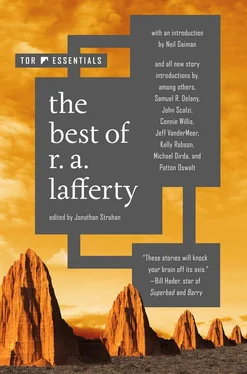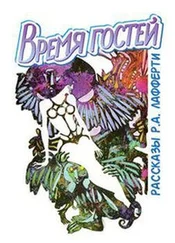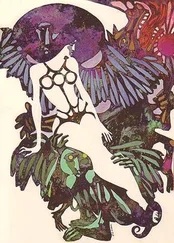“Wise Willy here said it correctly to you last night; that they were the scrubs who bottom the breed. But do not demean the scrubs: they are the foundation. They are human as all of us are human. They are a race that underlies the other several races of man. When the bones and blood of the more manifest races grow too thin, then they sustain you with the mixture of their strong kingship: the mixing always goes on, but in special eras it is more widespread. They are the link that is never really missing, the link between the clay and the blood.”
“Why are they, and me if I were not well-kempt and eminent, sometimes taken to be animals?” Velikof asked. “Why do they always live in such outlandish places?”
“They don’t always. Sometimes they live in very inlandish places. Even wise Willy understands that. But it is their function to stand apart and grow in strength. Look at the strong bone structure of that girl there! It is their function to invent forms—look at the form her mother invented for her. They have a depth of mind, and they have it particularly in those ghostly areas where the other races lack it. And they share and mingle it in those sudden motley ages of great achievement and vigor. Consider the great ages of Athens, of Florence, of Los Angeles. And afterward, this people will withdraw again to gather new strength and bottom.”
“And why are they centered here in a tumble-down hotel that is like a series of old daguerreotypes?” Willy McGilly asked. “Will you tell us that there is something cosmic about this little old hotel, as there is about this little old river?”
“Aye, of course there is, Willy. This is the hotel named Xenodocheion. This is the special center of these Xenoi, these strangers, and of all strangers everywhere. It isn’t small; it is merely that you can see but a portion of it at one time. And then they center here to keep out of the way. Sometimes they live in areas and neighborhoods that regularized humanity has abandoned (whether in inner-city or boondock). Sometimes they live in eras and decades that regularized humanity has abandoned: for their profundity of mind in the more ghostly areas, they have come to have a cavalier way with time. What is wrong with that? If regular people are finished with those days and times, why may not others use them?”
The roaring and booming to the west of the thunder had become very loud and very near now, and in the immediate outdoors there was heavy rain.
“It is the time,” the girl Crayola Catfish cried out in her powerful and intricate voice. “The flash flood is upon us and it will smash everything. We will all go and lie down in the river.”
They all began to follow her out, the Boomer Flats people, and the Giants among them; the eminents, everybody.
“Will you also lie down in the river, Comet?” Willy McGilly asked. “Somehow I don’t believe it of you.”
“No, I will not. That isn’t my way. I will take my horse and buggy and ascend above it.”
“Ah, but Comet, will it look like a horse and buggy to us?”
“No, it will look quite other, if you do chance to see it.”
“And what are you really, Comet?” Velikof asked him as they left him. “What species do you belong to?”
“To the human species, of course, Velikof. I belong to still another race of it; another race that mixes sometimes, and then withdraws again to gather more strength and depth. Some individuals of us withdraw for quite long times. There are a number of races of us in the wide cousinship, you see, and it is a necessity that we be strangers to each other for a good part of the time.”
“Are you a saucerian?”
“Oh saucerian be damned, Velikof! Harma means chariot or it means buggy; it does not mean saucer. We are the comets. And our own mingling with the commonalty of people has also had quite a bit to do with those sudden incandescent eras. Say, I’d like to talk with you fellows again some time. I’ll be by this way again in about eighty-seven years.”
“Maybe so,” said Dr. Velikof Vonk.
“Maybe so,” said Willy McGilly.
The eminents followed the Boomer Flats people to the river. And the Comet, we suppose, took his horse and buggy and ascended out of it. Odd old fellow he was; pieces falling off him; he’d hardly last another hundred years.
The red and black river was in surging flood with a blood-colored crest bearing down. And the flats—they were just too flat. The flood would be a mile wide here in one minute and everywhere in that width it would be deep enough and swift enough to drown a man. It was near dark: it was near the limit of roaring sound. But there was a pile of large rocks there in the deepening shallows: plenty of rocks: at least one big heavy rock for every person.
The Boomer Flats people understood what the rocks were for, and the Giants among them understood. Two of the eminents understood; and one of them, Arpad, apparently did not. Arpad was carrying on in great fear about the dangers of death by drowning.
Quickly then, to cram mud into the eyes and ears and noses and mouths. There is plenty of mud and all of it is good. Spirits of Catfish protect us now!—it will be only for a few hours, for two or three days at the most.
Arpad alone panicked. He broke and ran when Crayola Catfish tried to put mud in his mouth and nose to save him. He ran and stumbled in the rising waters to his death.
But all the others understood. They lay down in the red roaring river, and one of the Giants set a heavy rock on the breast of every person of them to hold them down. The last of the Giants then rolled the biggest of the rocks onto his own breast.
So all were safe on the bottom of the surging torrent, safe in the old mud-clay cradle. Nobody can stand against a surging flood like that: the only way is to lie down on the bottom and wait it out. And it was a refreshing, a deepening, a renewing experience. There are persons, both inside and outside the orders, who make religious retreats of three days every year for their renewal. This was very like such a retreat.
When the flood had subsided (this was three days later), they all rose again, rolling the big rocks off their breasts; they cleared their eyes and ears and mouths of the preserving mud, and they resumed their ways and days.
For Velikof Vonk and for Willy McGilly it had been an enriching experience. They had found the link that was not really lost, leaving the other ninety-nine meanwhile. They had grown in cousinship and wisdom. They said they would return to the flats every year at mud-duck season and turtle-egg season. They went back to T-Town enlarged and happy.
There is, however, a gap in the Magi set, due to the foolish dying of Arpad Arkabaranan. It is not of scripture that a set of Magi should consist of only three. There have been sets of seven and nine and eleven. It is almost of scripture, though, that a set should not consist of less than three. In the Masulla Apocalypse it seems to be said that a set must contain at the least a Comet, a Commoner, and a Catfish. The meaning of this is pretty muddy, and it may be a mistranslation.
There is Dr. Velikof Vonk with his huge head, with his heavy orbital ridges, with the protruding near-muzzle on him that makes the chin unnecessary and impossible, with the great back-brain and the great good humor. He is (and you had already guessed it of him) an ABSM, a neo-Neanderthal, an unmissing link, one of that branch of the human race that lives closest to the clay and the catfish.
There is Willy McGilly who belongs (and he himself has come to the realization of this quite lately) to that race of mankind called the Comets. He is quite bright, and he has his periods. He himself is a short-orbit comet, but for all that he has been among the stars. Pieces fall off of him; he leaves a wake; but he’ll last a while yet.
Читать дальше




![Рафаэль Лафферти - Дни, полные любви и смерти. Лучшее [сборник litres]](/books/385123/rafael-lafferti-dni-polnye-lyubvi-i-smerti-luchshe-thumb.webp)
![Рафаэль Лафферти - Лучшее [Сборник фантастических рассказов]](/books/401500/rafael-lafferti-luchshee-sbornik-fantasticheskih-ra-thumb.webp)